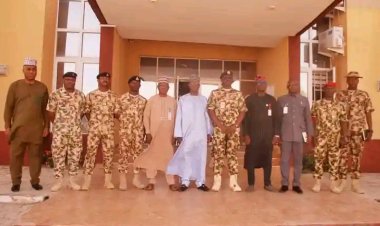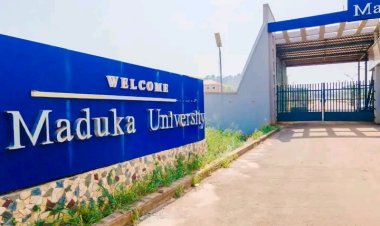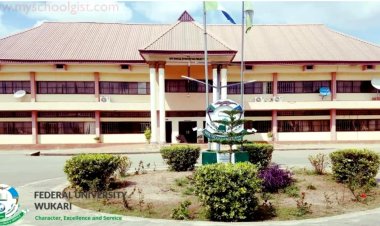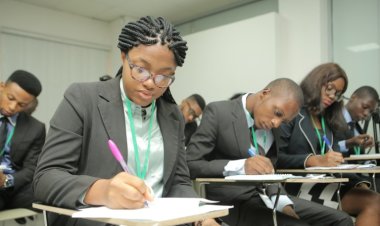Meet Dr. Belusochi Joe-Ikechebelu, Babcock University Graduate with 8 distinctions
Dr. Belusochi Joe-Ikechebelu, Babcock University Graduate with 8 distinctions, She followed the footsteps of her father, an Obstetrics and Gynaecology Professor and Deputy Vice-Chancellor (Administration), Nnamdi Azikiwe University (UNIZIK) Awka, Joseph Ikechebelu and mother
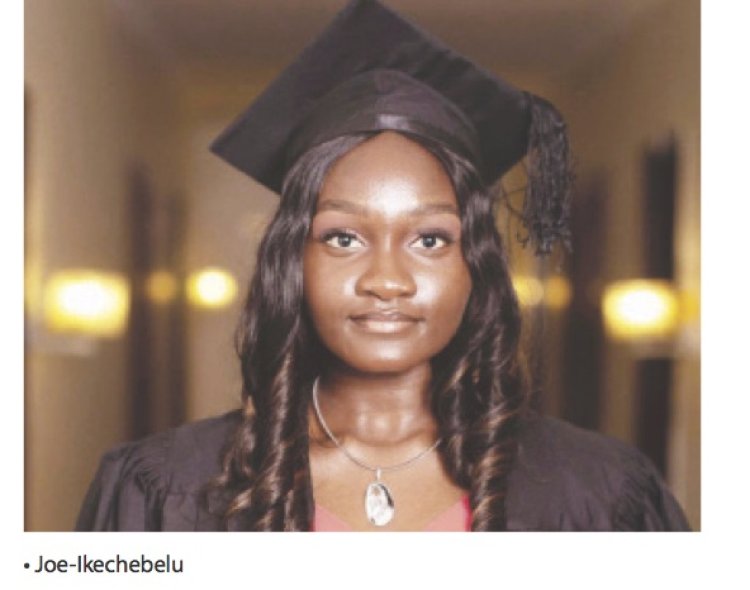
How Babcock varsity best medical doctor made 8 distinctions, Dr. Belusochi Joe-Ikechebelu, Babcock University Graduate with 8 distinctions, She followed the footsteps of her father, an Obstetrics and Gynaecology Professor and Deputy Vice-Chancellor (Administration), Nnamdi Azikiwe University (UNIZIK) Awka, Joseph Ikechebelu and mother, Professor of Community Medicine and Primary Health Care, Chukwuemeka Odumegwu Ojukwu University, Amaku-Awka, Anambra State, Ngozi Ikechebelu.
At the seventh induction of graduating medical doctors of Benjamin Carson Senior College of Health and Medical Sciences, Babcock University (BU), Ilishan-Remo, Ogun State, Dr. Belusochi Joe-Ikechebelu was the star attraction with eight distinctions.
She followed the footsteps of her father, an Obstetrics and Gynaecology Professor and Deputy Vice-Chancellor (Administration), Nnamdi Azikiwe University (UNIZIK) Awka, Joseph Ikechebelu and mother, Professor of Community Medicine and Primary Health Care, Chukwuemeka Odumegwu Ojukwu University, Amaku-Awka, Anambra State, Ngozi Ikechebelu.
In this interview with The Education Report, she narrated her six-year sojourn in BU and the secret of her success among other things.
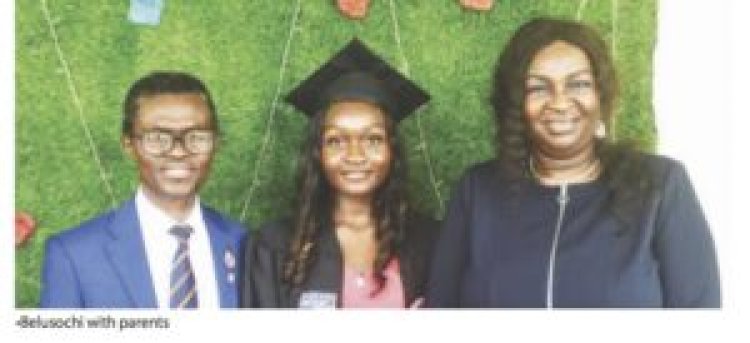
How was your primary and secondary education like?
My primary school education was at God’s Wisdom International School, Nnewi, Anambra State. It was an excellent course as I was among the top. My secondary education was at British Nigerian Academy, Abuja. I graduated in 2016 as the best student in Biology, Chemistry, Physics and Mathematics.
I also competed in the Mathematics Olympiad Competition and won a bronze medal. I was the overall next best graduating student for that year. So, for my university, I didn’t want to be the next best but the overall best.
Was MBBS your choice of course or your parents influenced it?
I can say it’s my choice though not without the influence of my parents. I have been surrounded by medical and health profession for as long as I can remember. I thought about other courses, but Medicine was better economically as it can provide better job security.
Why Babcock University?
I wanted to study abroad. I got admission into three universities in America to study Biological Sciences prelude to Medicine. But my father declined on reasons best known to him. He wanted me to study at UNIZIK as he believed so much in his university.
I, however, preferred a good private university if I was not supported to go abroad. This is how Babcock came into the picture. I have been to private schools at primary and secondary level and know that good private schools have great quality.
UNIZIK offered you admission, why did you reject it?
I did not reject it per say. Rather, I didn’t want to be so close to home (as my parents wished). I considered exposure to different environments to be part of the learning experience. My primary school was in the East my secondary school was in the North.
Going to the West would help broaden my life approaches. Besides making me a near complete Nigerian, who has intersected with some regions in Nigeria. I was also unhappy with recurrent strikes in public universities, as I saw my friends and family impacted by these strikes.
Six years as a medical student, how did you cope?
In retrospect, the first two, three years passed on quicker than I could imagine. I was filled with excitement on learning the anatomy and physiology of the human body and others. Nevertheless, it was still hard.
The most unsaid thing about Medicine, or maybe it’s said but doesn’t weigh in till you’re studying the course is the volume of information that you’re expected to know.
By the last three years, I was getting tired of constantly being in school, and reading one course after another. But it was the point of no return, that degree must be bagged!
I remember back around my second or third year, I asked one of my seniors, “does it get easier as you go higher?” He said: “No, it doesn’t.” I was astonished and dumbfounded at his reply.
What helped me to cope was having other extracurricular activities. I was part of the school Badminton team and football team. I had my other side hobbies, which included Yoga, Hand balancing and Contortion.
They were very important to me as a source of recharge to be able to push through and get to the finishing line. I had friends in other courses too that I would meet up with and socialise.
I’ll not be an advocate of focusing on your academics only, not making time for anything else. It’s as important to create a healthy balance between all parts of your life. Undoubtedly, it may not always remain balanced as you may have to put more focus where needed and when due.
During COVID-19, how did you cope?
COVID-19 affected my studies, much more than I would have thought. We were at home for six months. Although we had online class for most of it, it wasn’t the same anymore. I felt the passion for Medicine being sucked out of me.
By the time we resumed, it was so hard, mentally, to commence learning again. This also happened to coincide with 500-Level, one of the longest years in medical school. I thank God for pulling me out of that “rut” on time before my major medical board exam.
Did you have time for social life on campus?
Yes, I did, as much as I could. I made friends, hung out with them as often as I could. They also understood when I wasn’t available as much. But I also lost some relationships because of how unavailable I could get. But it’s part of life.
In medical school, it gets lonelier towards your final year. All your friends in other four, five years’ courses have graduated and moved on. You slowly watch your circle of friends slim down.
You emerged the best overall student with eight distinctions, how did you attain this feat?
It was a lot of dedication and hard work. Find what works for you. I don’t read at night because it doesn’t work for me. Once it’s 10pm, I’m asleep most times to wake up 3.00/4.00am to read. Just because everyone around you is reading till daylight doesn’t mean you should, especially if you know it doesn’t work for you.
I remember that for every exam, I prayed for the best result. But I can say that it is more of my family’s fervent prayer that kept me going and picking the distinctions from one level to another. I have this mind-set that “if it’s worth your while and if it’s important to you, give it your all.”
Your father said you beat his record, did you set out to achieve that?
No, I didn’t. But it happened. I thank God.
Your father endowed a 10-year prize for the best MBBS student, what was your reaction?
Definitely shocked, as I was not expecting that. I knew they (my mum and dad) were excited and humbly proud, but I didn’t see that coming.
If you were appointed Minister of Health, what difference would you bring to the health sector?
First, it would be to increase the budget allocation to the health sector. Approximately six per cent is allocated instead of the advised 15 per cent by the African Union. This poor budget allocation in turns leads to poorly resourced federal, state and local hospitals, understaffed, overworked and under-paid workers.
Take a look at the current “japa syndrome” we are facing with medical personnel, the common denominator is being severely under-paid. If a doctor has to start a side hustle to survive in Nigeria, then there’s something wrong as Medicine itself is already demanding.
What makes your family thick?
I can say is our undivided trust and faith in the Almighty God with whom all things are possible. My parents are Bible study teachers and serve as church leaders too.
I am from an academic family with medical bias and reading culture. My father is a medical doctor, a Professor in Obstetrics and Gynaecology and also Deputy Vice Chancellor, (Administration), Nnamdi Azikiwe University Awka.
My mother is a medical doctor, a university Professor in Community Medicine and Primary Health Care a Chukwuemeka Odumegwu Ojukwu University, Amaku, Awka, Anambra State. She is still reading and studying. She is a TETFund scholar, sponsored by her university for a PhD program at the University of Victoria
My maternal grandfather was also a veterinary doctor. My mother will always say that my grandfather believed Vet Medicine was harder than Human Medicine, because Veterinary programme involved more than one animal.
My grandmother retired as a chief Nursing Officer. This places me as a third-generation doctor in the family lineage. Let me also add that I am from the great land of Abagana (Abagana bu Enyi) in Anambra State.

